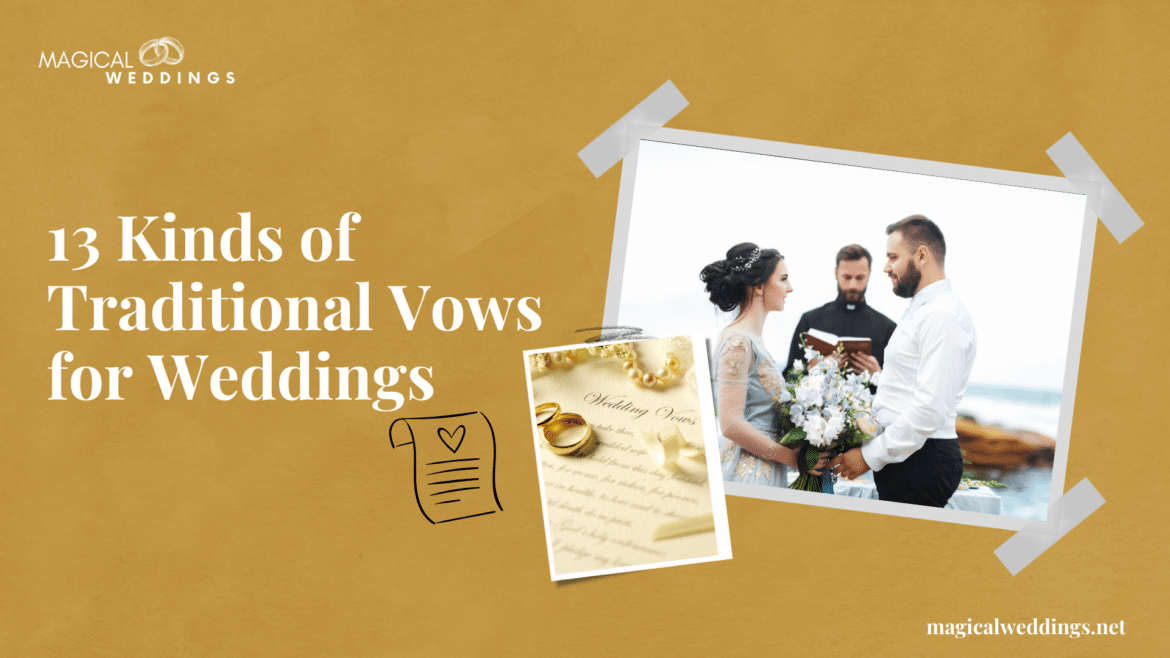Table of Contents
Till death do us part. Have you ever heard the bride and groom say it on their most special day? These lines sound emotional, but at the same time, they seem like a promise for life as well. To take vows at your wedding is a really necessary thing, whether in terms of traditions or just a lifetime promise. Just like the ones in corpse bride, if you may have seen it. When it’s time for your big day, you prepare for everything. But for your wedding vows, you also need to plan everything. Worry not if you’re a little bit anxious on your big day, as we will help you find the perfect traditional wedding vows. Let’s celebrate love together!
Traditional Wedding Vows
As you walk that floral archway aisle, you have several emotions running across your mind. A feeling of love, emotional feelings, being overwhelmed, and several others. All these emotions are justified as one starts a new chapter of one’s life. Traditional wedding vows provide a tried-and-true option for individuals who find reciting self-written commitments intimidating. Frequently derived from religious customs, such as Christian or Catholic rites, these vows contain well-known expressions like for richer or poorer, in sickness and health, and until death do us part. Let’s take a look at these vows before our big day!
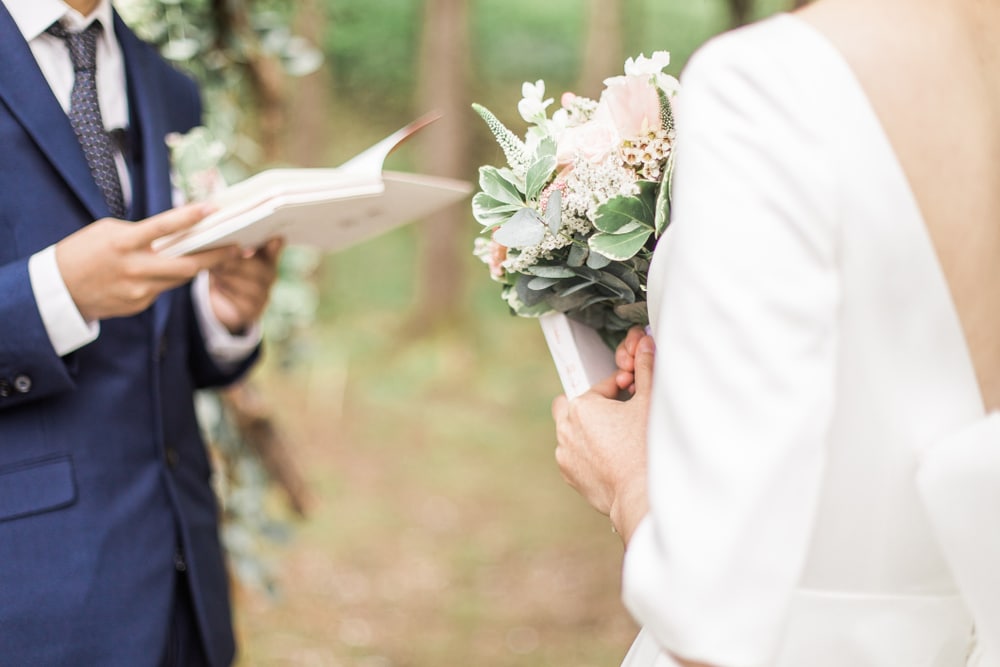
13 Heartwarming Traditional Wedding Vows
Here is a look at some of the very traditional wedding vows for weddings all around the globe.
1. Jewish Traditional Wedding Vows
- Vows are recited at the exchanging of rings in Jewish wedding ceremonies.
- The bridegroom responds, An outline of the script; Harey at mekuddeshet li B’taba’at zo at Moshe V’israel, which means, Behold, thou are consecrated unto me with this ring according to the law of Moses and Israel.
- In double-ring ceremonies, the bride says the same thing, but she changes the gender.
- In Hebrew, I am my beloved’s, and my beloved is mine is frequently said.
2. Catholic Wedding Vows
During a Catholic wedding, the bride and groom exchange significant promises. They say, from this day on, for better or worse for richer or worse, in sickness and in health, till death do us part, I take you for my lawful wife/husband. I promise always to love and respect you.
- Rings are given and received as representations of loyalty and affection.
- A vow is a serious, lifetime commitment.
- The ritual has religious, solid, and traditional roots.
3. Episcopal Wedding Vows
The traditional Episcopal wedding vows emphasize a lifelong commitment to God’s presence between couples. As part of their vows, the couple commits to love, appreciate, and respect one another during good times and bad, as well as in health and illness. The exchanging of rings represents these commitments and promises.
- With this, the groom says, I give you this ring as a symbol of my vow.
- If the ceremony involves two rings, the bride gives back the favor.
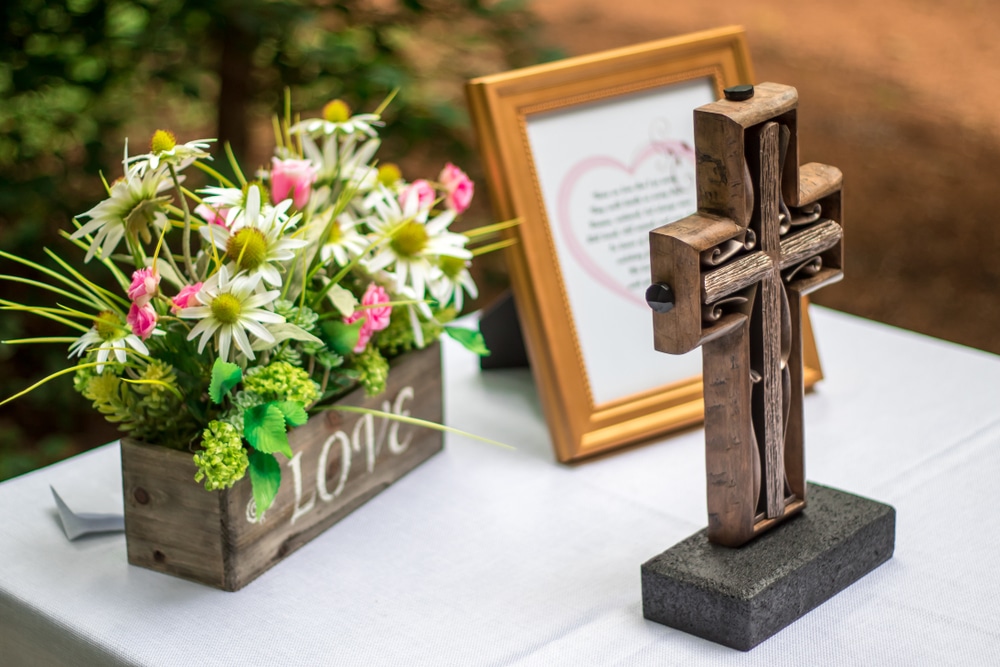
4. Presbyterian Vows
Presbyterian wedding vows emphasize loyalty and dedication. In front of God and witnesses, the couple promises to be faithful and loving no matter what. In a double-ring ceremony, the bride places a ring on the groom’s finger to symbolize their unwavering love and faith.
- Made with abundance and lack, happiness and sadness
- Rings stand for unwavering faith and enduring love.
5. Protestant Wedding Vows
Protestant marriage vows commit couples to love and adore one another forever and uphold their faith until the end. Invoking the Holy Trinity, the groom (and bride in a double-ring wedding) exchange rings as a sign of love and respect during the ring exchange.
- Couples promise to stick together no matter what.
- Rings stand for honor and affection.
- The celebrant bestows a benediction during the ritual.
6. Muslim Religious Vows
Muslim marriage vows strongly emphasize faithfulness, honesty, and sincerity. The groom promises to be a devoted and supportive husband, and the bride promises to be an obedient and faithful wife. These promises are based on the precepts of the Holy Prophet and the Holy Quran.
- Bride: Swears to be obedient and faithful.
- Groom: Pledges loyalty and assistance.
- Islamic beliefs are the foundation of vows.
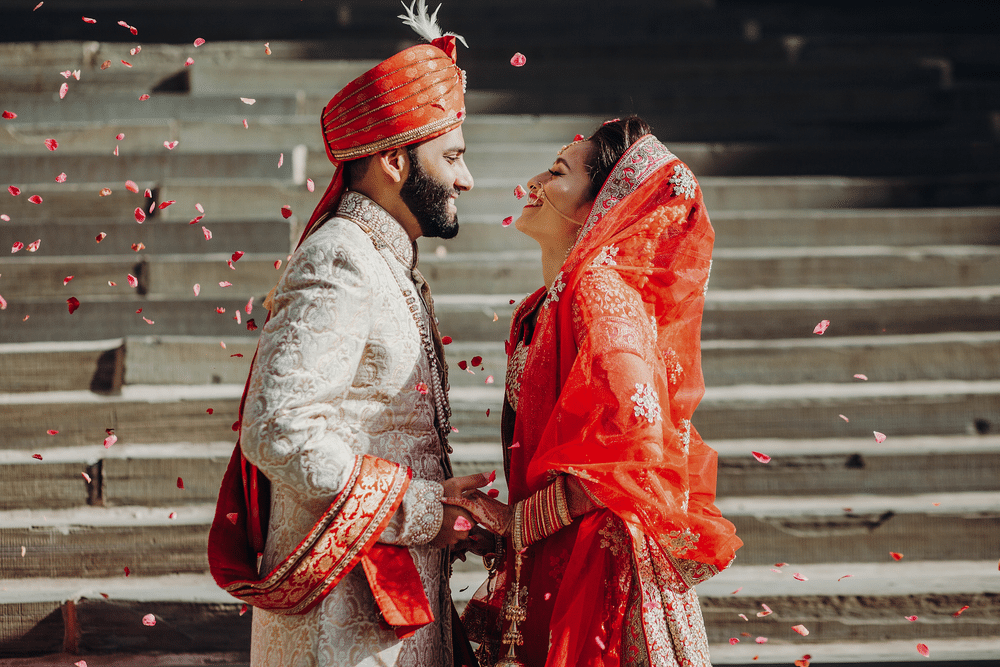
7. Hindu Tradition
To worship Agni, the god of fire, Hindu couples recite the saptapadi, or Seven Steps, at their wedding. As they circle the fire, they make the following promises.
- Satisfy material needs and guarantee prosperity.
- Grow stronger on the inside, out, and spiritually.
- Obtain and manage wealth sensibly.
- Sustain a cordial rapport.
- Raise morally upright and healthy kids.
- Assure coherence and suitability.
- Encourage enduring loyalty, camaraderie, and dependability.
8. Quaker Wedding Vows
Sincerity and simplicity are emphasized in Quaker traditional wedding vows. Couples vow to be devoted and loving partners with the help of God while they are with friends and God. Although exchanging rings is not customary in Quaker weddings, many couples include them.
- Couples make it a pledge to love and stick by one another.
- The vows acknowledge divine aid.
- Ring swaps are not customary, but they are frequently added.
9. Unitarian Traditional Wedding Vows
Respect for one another and personal dedication are often there in unitarian traditional wedding vows. A sample shows that they frequently say I take you, [name of your spouse], to be my spouse, promising to share my life openly with yours, to speak truthfully and lovingly in times of joy and challenge. These inclusive vows affirm the union equally.
- Emphasizes respect for one another and personal dedication.
- Emphasizes communicating honestly and kindly, as well as sharing life with others.
- Affirms marital equality and partnership.
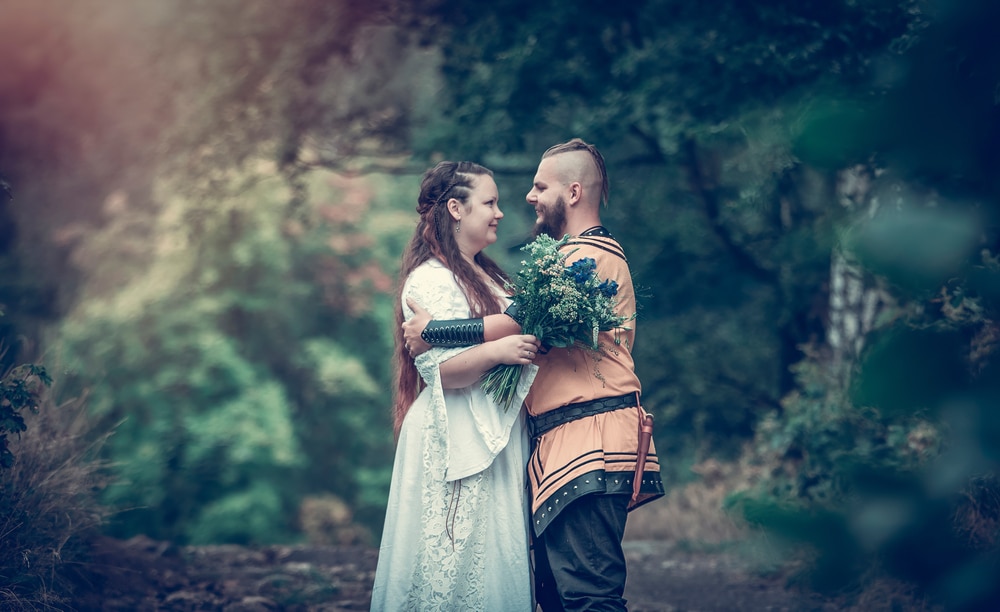
10. Non-Traditional Wedding Vows for Interfaith Marriage
The couple and their officiant customize non-traditional wedding vows to celebrate the diversity of religious origins. Every couple writes their vows, demonstrating dedication that goes beyond convention.
- Vows involve commitments to respect one another’s faiths and to understand them.
- Celebrating their respective cultural heritages, couples frequently promise to support one another through life’s obstacles.
- These ceremonies, which highlight love, honor, and unity throughout their lives together, are a fusion of several customs.
11. Non-Denominational Traditional Wedding
These traditional wedding vows go this way: The couples say to each other; you are now to dwell with me in the sacred union of marriage as my married [her/him]. I swear to cherish, honor, love, and console you. I promise to stay devoted to you and you for the rest of our lives.
- Personalization of words is possible with the exchange of rings.
- Vows place a strong emphasis on fidelity, love, and honor.
- Captures the oneness and holiness of marriage.
12. Methodist Wedding
During the unique ceremony, attendees actively participate in Methodist wedding vows by reciting prayers and singing. Methodist wedding ceremonies include call-and-response vows, in contrast to some Protestant ceremonies. When the officiant inquiries about the couple’s commitment to one another, they merely say, I do. I give you this ring as a sign of my vow, honoring you in the name of the Father, Son, and Holy Spirit, is said after exchanging rings. Amen.
- Methodist weddings invite guests to join in on the singing and prayers.
- A call-and-response approach is used to exchange vows, emphasizing clarity and simplicity.
- The exchanging of rings, followed by a severe pledge, represents a commitment.
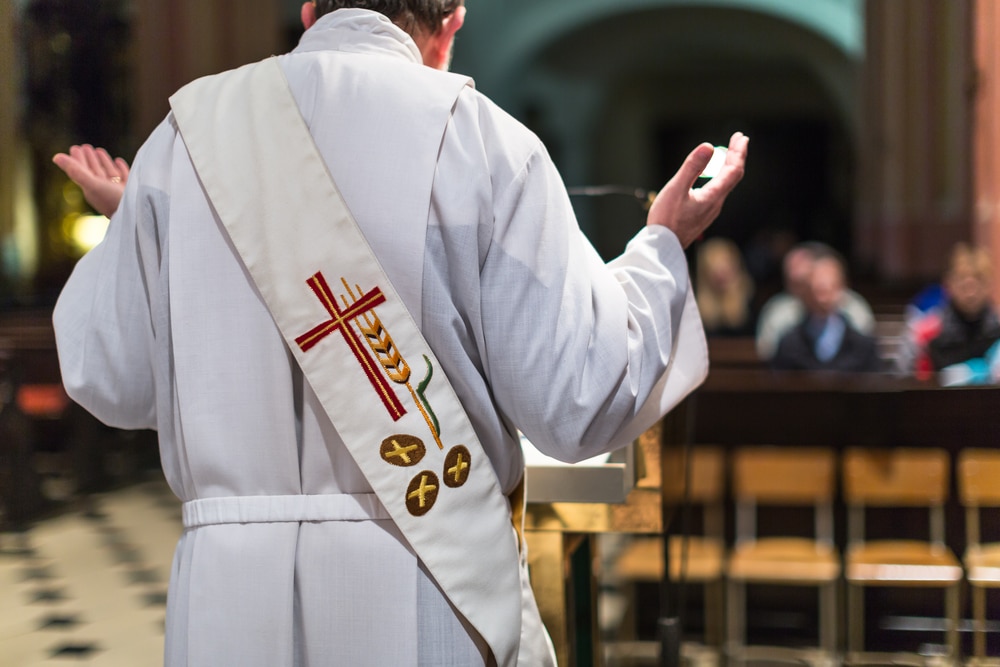
13. Lutheran Christian Wedding Vows
Theologian Martin Luther is honored at Lutheran Christian marriages, where the pair repeats the officiant’s traditional wedding vows. Promises of faithfulness, honesty, mutual care, respect, and trust are examples of vows. Ring exchanges are symbolic of loyalty and affection. Various Lutheran Church branches may have various blessings, readings, and prayers.
- The core values of vows include mutual understanding, commitment, and honesty.
- Rings are traded to symbolize a married couple’s love and faith.
- Variations in blessings and bible readings may be there in the ceremony.
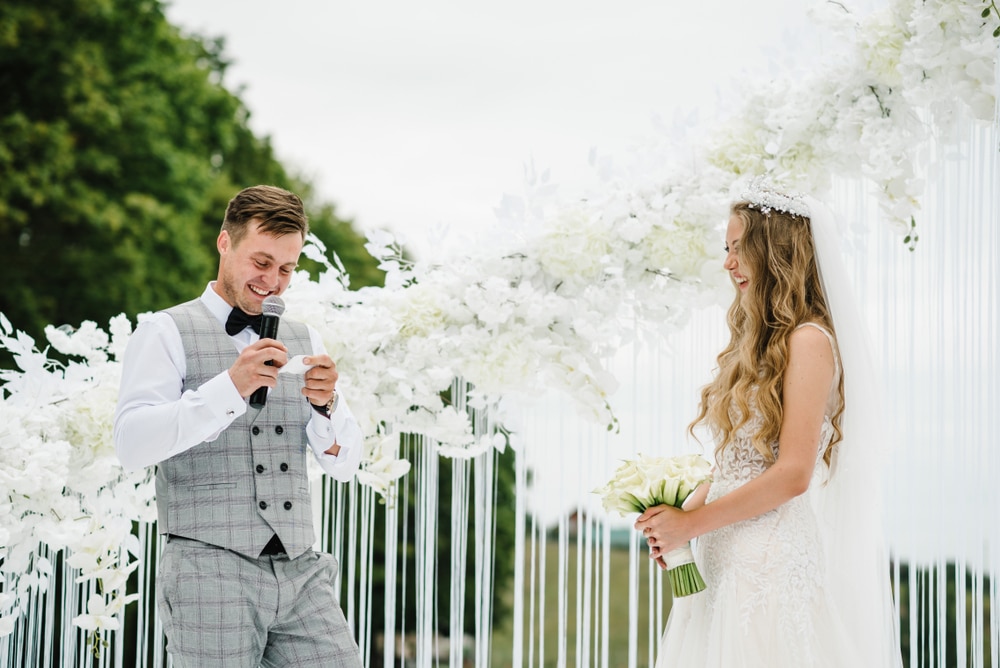
Final Thoughts
As we end, we’d say traditional wedding vows remain a timeless testament to love and commitment. Jewish vows promise to love, and to cherish, while Catholic vows pledge for richer or for poorer, in sickness and in health to love.
In conclusion, these traditional wedding vows, whether Christian, non-religious, or non-traditional vows, embody the essence of a wedding ceremony, symbolizing the couple’s commitment to share their lives in the presence of God and loved ones. These vows make the ceremony memorable.
HAVE A BLESSED WEDDED LIFE!

